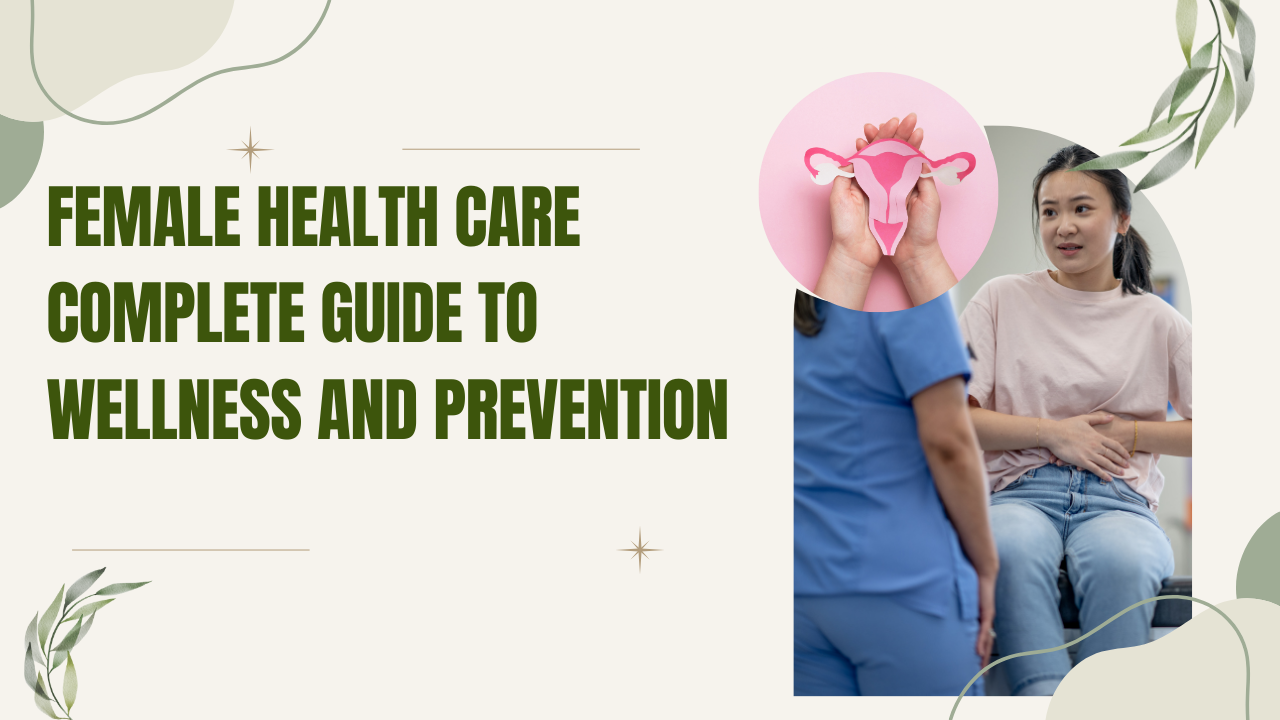Women’s health is a complex and important part of overall well-being. Unlike men, women go through unique physical and emotional changes at different stages of life. These changes begin during puberty and continue through pregnancy, childbirth, and menopause. Each phase brings specific health needs that require attention and care.
Hormonal shifts play a major role in shaping a woman’s health journey. These changes can affect mood, energy levels, and even long-term health risks. Female health care should focus on managing these changes with regular check-ups, screenings, and proper medical guidance. Early detection and prevention are key to maintaining good health.
Living a healthy lifestyle is also important for supporting female health care. Balanced nutrition, exercise, stress management, and sleep all contribute to long-term wellness. By understanding their unique health needs and accessing the right care, women can take control of their health and enjoy fuller, healthier lives at every age.
I. Reproductive Health: A Cornerstone of Female Health

Reproductive health is an essential part of a woman’s overall well-being. It includes important stages such as menstruation, pregnancy, and menopause. Each of these stages brings different physical and emotional changes that can affect daily life. Proper support and understanding during these times are vital for maintaining good health.
In the context of female health care, reproductive health should be carefully managed with regular check-ups and guidance from healthcare providers. Access to the right information and care helps women make informed choices about their bodies. By addressing reproductive health early, female health care can prevent complications and support a healthier future for women of all ages.
- Menstrual Health
A woman’s menstrual cycle is a natural and important sign of her overall health and hormonal balance. Common menstrual disorders like heavy bleeding (menorrhagia), painful cramps (dysmenorrhea), and irregular periods can affect daily life and may point to deeper health issues. Conditions such as polycystic ovary syndrome (PCOS), fibroids, or endometriosis are often linked to these symptoms. Understanding menstrual health is a key part of female health care. Regular check-ups and early attention to changes in the menstrual cycle can help in diagnosing problems early and improving a woman’s overall well-being through proper treatment and care.
Key Menstrual Health Tips:
Maintain a healthy diet to regulate hormones.
Manage stress levels, as stress can disrupt the menstrual cycle.
Seek medical advice if experiencing unusual symptoms, such as extreme pain or excessive bleeding.
- Pregnancy and Childbirth
Pregnancy is a major milestone in a woman’s life, and proper care during this time is essential for both mother and baby. Prenatal care includes regular check-ups, healthy eating, and close monitoring to support a smooth pregnancy journey. It helps detect and manage risks like gestational diabetes, high blood pressure, or preeclampsia early on. These steps are an important part of female health care, as they protect the health of the mother and promote the baby’s development. Timely and consistent prenatal care leads to better outcomes and supports the overall well-being of women during this special phase.
Prenatal Care Essentials:
Regular blood tests and ultrasounds to monitor fetal development.
Monitoring maternal weight gain and blood pressure.
Taking prenatal vitamins that include folic acid, which helps prevent neural tube defects.
During childbirth, women must have access to safe, well-managed care, whether they choose a hospital birth, home birth, or birthing center. Postpartum care, including mental health assessments and physical recovery, is just as important as prenatal care.
- Contraception and Family Planning
Family planning is an important part of a woman’s life, allowing her to make informed choices about when or if to have children. Choosing the right contraceptive method depends on personal health, lifestyle, and future goals. Options include hormonal methods like birth control pills and IUDs, barrier methods like condoms, permanent solutions such as sterilization, and natural planning techniques. These choices should be guided by healthcare professionals to ensure safety and effectiveness. Family planning is a key aspect of female health care, helping women take control of their reproductive health and plan their futures with confidence and support.
Factors to Consider for Contraception:
Hormonal contraception may affect mood, weight, and blood clotting, so discussing the best option with a healthcare provider is essential.
For women with pre-existing health conditions like diabetes or heart disease, some contraception methods may be contraindicated.
Consider the long-term health implications and reversibility of each method.
II. Sexual Health and Wellness
Sexual health is an important part of a woman’s overall well-being and quality of life. Women may experience unique sexual health concerns, such as discomfort during intercourse, low libido, or changes linked to hormonal shifts. These issues often need careful and respectful attention from healthcare providers who understand the specific needs of women.
In female health care, addressing sexual health is essential. It includes regular screenings, open conversations, and proper guidance to prevent sexually transmitted infections (STIs) and manage any sexual dysfunction. By seeking the right care, women can maintain healthy and fulfilling sexual lives. Supporting sexual health not only improves physical wellness but also boosts confidence, relationships, and emotional well-being throughout a woman’s life.

- STIs and Preventative Care
Sexually transmitted infections (STIs) are a serious concern in women’s sexual health and require proper attention. Regular screening for common infections like chlamydia, gonorrhea, HPV, and HIV is important for all sexually active women. Early detection helps prevent complications and supports overall health. Using barrier methods such as condoms is one of the most effective ways to lower the risk of STIs. In female health care, STI prevention and routine testing play a vital role in maintaining long-term wellness. By staying informed and practicing safe habits, women can protect their health and make responsible choices for their sexual well-being.
Key Practices for Preventing STIs:
Regular STI screenings, especially for women with multiple sexual partners or high-risk behaviors.
The HPV vaccine can protect against several strains of the virus linked to cervical cancer.
Practicing safe sex and having open conversations with partners about sexual health.
- Female Sexual Dysfunction
Female sexual dysfunction (FSD) is a condition that impacts a woman’s ability to enjoy sexual activity. It can involve symptoms such as low libido, vaginal dryness, or trouble reaching orgasm. These issues may stem from various causes, including hormonal imbalances, emotional stress, or medical conditions like diabetes. Targeting FSD is an important aspect of female health care, as it involves understanding and treating the underlying causes to restore sexual well-being. Seeking guidance from healthcare professionals can help women manage FSD effectively, leading to improved sexual health and a better quality of life.
Managing Female Sexual Dysfunction:
Hormone replacement therapy (HRT) may be considered for women experiencing dryness or low libido due to hormonal fluctuations.
Psychosexual therapy can help address emotional or psychological barriers.
Using lubricants or moisturizers for vaginal dryness.
III. Menopause: The Transition into Later Life
Menopause marks the end of a woman’s reproductive years and brings significant hormonal and physical changes. This natural transition typically occurs between the ages of 45 and 55 and involves the cessation of menstruation. Symptoms such as hot flashes, night sweats, mood swings, and sleep disturbances are common during this phase.
Understanding menopause and its effects is essential for managing this stage of life with comfort and confidence. Female health care plays a crucial role in helping women navigate menopause by providing support, treatment options, and advice on managing symptoms. Regular check-ups and discussions with healthcare providers can ensure women receive the proper care to maintain their well-being during this time.
- Symptoms and Signs of Menopause

Menopause usually occurs between the ages of 45 and 55, marking the end of a woman’s reproductive years. Before menopause, women experience perimenopause, a transitional phase that can last several years. During this time, hormonal changes occur, leading to symptoms such as hot flashes, mood swings, and irregular periods. Female health care is essential during this period to help manage these changes and provide support. Regular check-ups with healthcare providers can ensure women receive the guidance and treatment needed for a smoother transition into menopause. Symptoms of menopause can include:
Hot flashes and night sweats.
Irregular periods.
Mood swings and irritability.
Sleep disturbances.
Vaginal dryness and urinary incontinence.
- Managing Menopause
Hormone replacement therapy (HRT) is often used to relieve menopause symptoms like hot flashes and vaginal dryness. While HRT can be effective, it comes with risks, including an increased risk of breast cancer and blood clots. It’s crucial for women to consult with a healthcare provider before starting HRT. Female health care professionals can help assess individual needs, evaluate potential risks, and discuss alternative treatments. This ensures women make informed decisions about managing menopause symptoms in the safest way possible. Regular check-ups are key to ongoing health during this phase.
Non-Hormonal Alternatives:
Lifestyle changes, such as regular exercise and stress management techniques, can alleviate many menopause symptoms.
Over-the-counter lubricants and moisturizers help with vaginal dryness.
Cognitive-behavioral therapy (CBT) and mindfulness practices can reduce stress and help manage mood swings.
IV. Mental Health and Women’s Well-being
Mental health is a vital yet often overlooked aspect of female health. Women are more likely to experience mood disorders, including depression and anxiety, which can significantly impact their overall well-being. Hormonal fluctuations, life stressors, and societal pressures can contribute to these mental health challenges.
Trageting mental health in female health care is crucial, as early intervention and support can help women manage symptoms and improve their quality of life. Regular check-ups, open discussions, and appropriate treatment options are essential for maintaining both physical and emotional health. By prioritizing mental health, women can better navigate life’s challenges and achieve better overall wellness.

- Depression and Anxiety in Women
Hormonal changes throughout a woman’s life, from menstruation to pregnancy and menopause, can influence mental health. Postpartum depression is particularly prevalent in women following childbirth, with approximately 10–15% of new mothers experiencing this condition.
Managing Mental Health:
Seeking therapy or counseling for emotional support.
Medication, such as antidepressants or anti-anxiety medication, may be prescribed in severe cases.
Engaging in physical activity and maintaining a balanced diet to improve mental health.
- The Importance of Self-Care
Women often juggle multiple roles, from being caregivers to professionals, which can contribute to stress and burnout. Taking time for self-care is essential for mental health. This includes activities such as:
Practicing mindfulness, meditation, or yoga.
Pursuing hobbies and activities that bring joy.
Seeking support from family, friends, or professional counselors when needed.
V. Preventative Care and Health Screenings
Preventative care plays a vital role in maintaining a woman’s overall health. Regular screenings and health check-ups are key to detecting potential issues early, allowing for timely intervention. Early detection can prevent minor health concerns from developing into serious conditions, leading to better outcomes in the long run.
Female health care focuses on providing these essential services, helping women stay proactive about their health. Routine visits to healthcare providers for exams, vaccinations, and screenings ensure that women can address any concerns before they escalate. By prioritizing preventative care, women can take control of their health and maintain a higher quality of life throughout their lives.
- Routine Health Screenings
Breast Cancer Screening: Regular mammograms and breast self-exams help detect breast cancer early, increasing the chances of successful treatment.
Cervical Cancer Screening: Pap smears and HPV tests can detect abnormal cells in the cervix that may lead to cervical cancer.
Bone Density Testing: Women are at a higher risk of osteoporosis, especially after menopause. Bone density tests help assess bone health.
- Healthy Lifestyle Choices
Maintaining a healthy lifestyle can prevent many chronic diseases. Key factors include:
Diet: A balanced diet rich in fruits, vegetables, lean proteins, and whole grains helps prevent obesity, heart disease, and diabetes.
Exercise: Regular physical activity, including strength training and cardio, improves cardiovascular health, bone density, and mental health.
Sleep: Prioritizing 7–9 hours of quality sleep each night supports overall well-being.
VI. Targeting Disparities in Female Healthcare
Women have unique healthcare needs, but they often face systemic barriers when trying to access proper care. Factors like gender bias, unequal access to healthcare, and cultural stigmas surrounding issues such as menstruation, menopause, and sexual health can discourage women from seeking the care they need. These obstacles can delay diagnosis and treatment, affecting women’s overall health.
Female health care must address these challenges by promoting equal access to services and reducing stigma around women’s health issues. Encouraging open conversations and providing education can help women feel more comfortable seeking care. By breaking down these barriers, women can receive the necessary support and medical attention to maintain their health and well-being.
Gender Bias in Healthcare
Studies have revealed that women’s health concerns are often dismissed or underestimated in clinical environments, leading to delayed diagnoses or inadequate treatments. This gender bias can result in women receiving less attention for serious health issues, affecting their well-being. To combat this, it is crucial for women to advocate for their health, seek second opinions when necessary, and push for healthcare settings that are more aware of gender-specific needs. Creating gender-sensitive female health care environments where women’s voices are heard and their concerns taken seriously can significantly improve health outcomes.
Healthcare Accessibility
In many regions, women face significant challenges in accessing quality healthcare services due to financial constraints or geographical limitations. These barriers can prevent women from receiving timely care, which is essential for preventing or managing health issues. Addressing these disparities is a key aspect of improving female health care, ensuring that all women, regardless of location or income, have equal access to necessary medical services. Efforts to improve healthcare accessibility should focus on reducing costs, expanding healthcare facilities in underserved areas, and providing education to empower women to seek care.
Conclusion

Female healthcare goes beyond treating physical symptoms; it involves understanding the distinct needs of women at every stage of life. From puberty and reproductive health to menopause and mental well-being, women’s health requires a comprehensive and empathetic approach.
Taking charge of one’s health through education, advocacy for necessary care, and adopting healthy lifestyle choices can help women maintain a balanced and healthy life. In doing so, women are empowered to make informed decisions about their health and well-being.
It’s essential for society to continue removing barriers and creating accessible female health care systems. These systems should cater to the specific needs of women, ensuring they receive the care they deserve. By doing so, women will be better equipped to take control of their health, leading to improved outcomes and a higher quality of life.
FAQs
- What are common menstrual problems and how can I manage them ?
Common issues like painful periods and heavy bleeding can be treated with medications or hormonal birth control. Regular check-ups for female health care can help diagnose underlying conditions like PCOS or fibroids, and doctors can offer personalized treatments. - How can I manage menopause symptoms ?
Managing menopause involves lifestyle changes like exercise, a balanced diet, and possibly hormone replacement therapy (HRT). Female health care specialists can help guide you on the best treatments for hot flashes, mood swings, and other symptoms. - When should I start getting mammograms and Pap smears ?
Mammograms are recommended starting at age 45, and Pap smears should begin at age 21. Regular female health care check-ups help ensure early detection of any health issues. - What are the best birth control options for women ?
Options like birth control pills, IUDs, and condoms are common. Discussing with a female health care provider can help you choose the method that fits your lifestyle and health needs. - How can I take care of my mental health during pregnancy or postpartum ?
Pregnancy and postpartum periods can be challenging for mental health. Female health care providers can offer support, therapy, and treatment for conditions like postpartum depression.

